- Home
- Michael Crichton
Venom Business Page 6
Venom Business Read online
Page 6
Raynaud grinned.
“Still,” Graham said, “one can’t blame them. It’s been going on for centuries, and I certainly can’t expect it to stop for one of my parties.”
Raynaud was about to reply when, looking across the guests on the terrace, he spotted a familiar face. It belonged to a chunky, muscular man of medium height, who stood next to a stunning blond girl.
Raynaud had not seen that face for more than ten years.
“Excuse me a moment,” he said to Graham. “There’s somebody here I’d like you to introduce me to.”
Graham did it perfectly. He walked up to the man and said, “Richard, I want you to meet a dear friend. Richard Pierce, Charles Raynaud.”
Richard Pierce looked up absently and extended his hand, “How are you, Raynaud?” Almost immediately, he turned away.
Graham frowned. It was clear to Raynaud that Pierce and Graham were not very friendly.
A moment passed. Pierce sipped his drink and then turned slowly back to Raynaud.
“Did you say…”
Raynaud grinned.
“Son of a bitch! Charles Raynaud!” He smiled broadly and held out his hand again. “Charles Raynaud, Jesus Christ! Charles Raynaud! What the hell are you doing here?”
“Actually, I’m—”
“No, no. Stand back and let me get a look at you. Jesus Christ, of all people. You look good.”
“So do you.”
Pierce grabbed Raynaud’s hand and pumped it a third time.
“Jesus, this is incredible. I’m a bugger’s aunt.”
Then he stopped and looked down at Graham.
“Sorry about that, Houghty.”
Graham did not reply. He turned to Raynaud. “Where did you meet this ostensible human being?”
“At Yale,” Raynaud said. “Years ago.”
“Yale,” Graham repeated. He spun back on Pierce. “You never told me you went to Yale, Richard. I take it you were sent down?”
Pierce stiffened. “It was a long time ago,” he said.
“I have no doubt of that. Well, I shall leave you two to discuss fond memories.”
He stomped off. Raynaud sensed that Graham was rather disappointed in him, but at the moment he did not care. He was immensely pleased to run into Pierce, particularly here.
Pierce looked at the blonde standing alongside him. He smacked her bottom. “Run along, sweets,” he said. “I’ll see you later.”
He threw his arm around Raynaud’s shoulder. “Come on, I’ll buy you a drink.”
“The liquor’s free.”
“Then I’ll buy you a girl.”
Raynaud smiled. “From what I can see, the girls are pretty free, too.”
Pierce shook his head. “Not the best ones, lad. Not the best.”
The use of the old term irritated Raynaud. Pierce had always called him lad, and apparently meant nothing by it, yet Raynaud found it condescending.
They came to the bar and got two glasses of champagne.
“So here you are,” Pierce said, “chatting it up with faggot authors in Paris. And dressed very expensively.” He touched Raynaud’s lapel. “You’ve been moving right along, haven’t you, lad? I always knew you would. Cheers.”
They raised glasses and drank.
“Are you staying out here?” Pierce asked.
“No, in Paris.”
“Where?”
“The George Cinq.”
Pierce raised his eyebrows. “My, you have been moving along. Did you marry into it, or steal it, or what?”
“Stole it,” Raynaud said.
“Good for you,” Pierce said. He lit a cigarette. “It’s marvelous to see you again. Staying long?”
“Awhile. I’m on business. First here, then London.”
“And then what?”
“I’ll go back to Mexico. Yucatán.”
“Good lord, you’re full of surprises tonight. Did you make your money in Yucatán?”
“In a sense.”
Pierce laughed. “You’re being very close about it. I suppose that’s the difference between a man dedicated to making money, and a man dedicated to spending it, like myself.”
“You have trouble spending it?” Raynaud asked, grinning.
“Frankly,” said Pierce, with mock gravity, “no.” He sipped the champagne. “This is terrible stuff.” He turned to the bartender. “What is it?”
“Piper-Heidseck sixty-four,” said the bartender.
“Ah, well, no wonder. Terrible.” He emptied his glass on the lawn. “Let’s drink scotch. Much safer.”
“It’s all right,” Raynaud said. “I’ll stick to champagne.”
“You’ll poison yourself,” Pierce warned
“I’ll take my chances.”
Pierce watched while the bartender made him a scotch on the rocks. “Houghty never did have any taste in champagne,” he said.
“I haven’t heard anyone call him by that name,” Raynaud said.
“Not surprised. He hates it.”
“You don’t get along?”
“No.” Pierce laughed. “For some reason, he considers me a lazy wastrel. Can’t imagine why. But he once called me that, to my face, and I didn’t appreciate it. We’ve been at knockers ever since.”
“Where are you living now?” Raynaud asked.
“London. I feel London is currently the best place in the world to spend money, except, of course, for Beirut. The best women are in Beirut. Ever been?”
“Yes,” Raynaud said.
Pierce shook his head in wonder. “You keep giving me these shocks,” he said, “and I’ll have a heart attack.”
He laughed, but it was not entirely pleasant. Hearing the veiled irritation, Raynaud was happier than he had been in a long time.
Shortly after midnight, Pierce told Raynaud that a friend had borrowed his car to take a girl home. Pierce was stranded; could he ride back into Paris with Raynaud? It was logical, since Pierce was also staying at the George Cinq.
Raynaud agreed.
Pierce went off to collect his blonde, and Raynaud said goodbye to Graham.
“It was good of you to come,” Graham said. “I hope you will visit me again. By the way, I have put in a draft at my Paris bank waiting for you in the sum of thirty thousand dollars. You need only present yourself with your passport to collect it in whatever form you wish. Is that satisfactory?”
“But we agreed on only twenty-five—”
“I won’t hear of it,” Graham said, holding up his hand. “But I do have a final word of advice.”
“Yes?”
“Watch out for Richard Pierce.”
“All right,” Raynaud said.
“I can see by your face you don’t take me seriously. I wish you would.” Graham leaned close. “Richard Pierce is a complete, utter, slime-coated bastard.”
4. PIERCE
THE THREE OF THEM—Raynaud, Pierce, and the girl—got into Raynaud’s car. Raynaud drove, and Pierce sat beside him. The girl sat in the back seat.
“Speak English,” Pierce said to Raynaud, as they set off down the long drive to the iron gate at the edge of the estate. “The snapper doesn’t understand much English. Her talents, I fear, are not linguistic, though she has an ingenious tongue.”
Raynaud glanced at the girl in the rear-view mirror. She was staring stonily forward, her pretty face bored.
Pierce lit a cigarette. “Now then,” he said, “tell me about yourself. What have you been up to all these years?”
“Oh, nothing much,” Raynaud said.
He had already decided to go slow with Richard, to play it very cool. His natural inclination, even in college, had been to treat Richard like a rich fool. But Richard was not a fool. Obnoxious, perhaps, but not a fool.
Pierce reached into his coat and withdrew a bottle.
“What’s that?”
“Some of Houghton’s crappy champagne. Better than nothing.” He peeled the foil, pulled away the wire, aimed the neck out the window, a
nd popped the cork with practiced smoothness.
“If you don’t like Graham, why’d you go to his party?”
“My mother,” Pierce said. “She and Houghton are good friends. When she heard he was having this party, she insisted I make an appearance. She was quite obnoxious about it, in fact. A bit odd.”
He took a swig and passed the bottle.
“But anyhow,” he said, “we’re celebrating. Drink up, and tell me what you’ve been doing. And don’t be so damnably offhand about it all. Infuriating.”
“All right,” Raynaud said.
He glanced over at Pierce, studying the features in the green light from the dashboard. His friend had aged: the handsome, almost delicate face was now brooding and dissipated, the features slack, the expression moody. But he still had his eyes: large, dark brown, with long lashes.
“Well, to begin with, I’ve made some money.”
“Obviously,” Pierce said.
“Doing various sorts of jobs, most of them easy. And I got married once. She was rich. Killed in an auto accident; her car went off a cliff.”
“And you inherited her fortune?”
“Some of it.”
Pierce laughed. “Charles, that’s wonderful. Really wonderful. Tell me, was that before or after you got out of jail?”
Raynaud gripped the wheel tightly and stared forward at the road. For the first time he sensed that everything, the whole damned plan, might be more complicated than he had suspected before.
Pierce continued to laugh softly. “You see, I’ve followed your career more closely than you might think, Charles. It was six months, wasn’t it?”
“Five and a half,” Raynaud said.
“For playing a confidence game in New York. That’s what the police thought it was.”
“Yes,” Raynaud said.
“But actually it was something else.”
Raynaud said, “You really have been following things closely.”
“And all for a reason,” Pierce said, suddenly serious. He paused. “You were smuggling then. Is that what you’re doing now? Artifacts?”
Raynaud shrugged.
“You needn’t be modest. You’re quite well known, in some circles. You supplied pieces for Sir Hugh Beckwith, and Lady Ashley Mountfort. Also Victor Seizel. Am I right?”
“You are.”
“Very skillful, by all reports,” Richard said. “Exceedingly clever. But one thing puzzles me, Charles.”
“What’s that?”
“Your other occupations.”
Raynaud said, “I have none.”
“I know all about your marriage,” Richard said. “But that was just to get Whittington’s whore into Canada. Have you been doing other jobs like, ah, that?”
“On occasion.”
Richard smiled slightly. “When the price is right?”
“Only when the price is right.”
Richard laughed. “You make it sound quite sinister, Charles. Have you ever killed anyone?”
“Not that I recall.”
“Could you kill someone?”
Raynaud hesitated just a moment. “No.”
“You’re quite sure?”
“Quite. Sorry.”
“Oh, don’t apologize. I find it reassuring.” Richard stared forward at the road, and then he laughed, a different hearty laugh, and Raynaud realized that he had changed his mood, with the same lightning facility he had shown ten years before. “Charles, this is really marvelous, seeing you again. Absolutely marvelous. My old drinking friend, an international smuggler. We must spend an evening together. When do you go to London?”
“Day after tomorrow, I think. It’s not definite.”
“Splendid! That’s just when I’m going back. You’ll stay at my flat, of course.”
“I don’t think—”
“Nonsense. I insist upon it.”
Raynaud said, “We can discuss it later.”
He had a brief mental image of all the long discussions they had had in the past, the endless hours in bars and restaurants and college haunts, where he had told stories of his youth in the slums, and how he had gotten the scar on his neck from Johnny Sloane, while Richard Pierce, the rich boy from England, bought the drinks and listened in silent fascination.
It was something he had not thought about for a long time.
“And you?” Raynaud said. “What’ve you been doing for ten years?”
“Spending money,” Pierce said. “I went into that business after I left Yale. It was where my natural aptitudes lay.” He laughed. “Did you know I went to the University of Geneva after Yale?”
“No,” Raynaud said. “How did you like it?”
“I was only there two weeks. Then my father died.”
“I’m sorry.”
“Don’t be. I wasn’t, particularly.”
He stared forward at the road, illuminated in the yellow French headlamps.
“I went home for the funeral,” Pierce said. “Bloody big affair. Dozens of MP’s and ministers and so on. And I talked with my mother. You should meet her sometime. She’s rather amusing, as a type. She’s a nymphomaniac, you know.” He snapped his fingers. “Come to think of it, you might have met her. She was in Mexico last year.”
There was something wrong about the way Pierce said it, something that instantly alerted Raynaud. It was a casual, offhand thought, but it did not come out that way.
Raynaud said, “I thought you knew all about me.”
“Just a few snatches of business gossip.”
“Well,” Raynaud said, “I’ve never met your mother.”
“Odd. I really thought you might have bumped into her at some point.”
“Mexico’s a big place.”
“Ummm. Well, anyway, after the funeral, I got tired of hanging around that big house, so I left and bought a flat in Belgravia. And a Maserati. Super car, absolutely marvelous: I used to drive it for hours on end, in the middle of the night.” He stopped and lit a cigarette, then said, “I suppose I was actually rather thrown off by my father’s death. I didn’t realize it then.”
With a long swallow, he finished the champagne and threw the bottle out the window.
“Ever since, I’ve had an allowance. Quite a nice one. You see, I haven’t come into the estate yet. There’s another two months to wait. Father stipulated that I had to be thirty-four years and two months.”
“Why that age?”
“He was sentimental. He was that old when he made his first million. Pounds.”
“I see.”
“He was always rather sentimental, even about my mother. Oh, by the bye, one thing: I’ve got myself engaged.”
“Congratulations.”
“Not exactly. I only did it to humor my mother. She thinks I’m unstable. Can’t imagine why. I did it for her.”
“Nice girl?”
“Gorgeous. She’s Italian. Sandra Callarini. Comes from a good family and all; she’s been working at Wentfield, in films. But not a monkey—quite the other way.”
“Monkey?”
Pierce laughed. “A monkey is a girl who holds her jobs with her tail.”
Raynaud laughed. Pierce had not changed. Not a bit.
“She has a maddeningly beautiful body,” Pierce said, “which she absolutely will not share. I dated her for three months—can you imagine?—and got nowhere. It began to prey on my mind. I lost sleep. I lost weight. I was nervous and restless. Then my mother began on this marriage thing, so I decided to kill two birds with one stone. So to speak.”
“When is the wedding?”
“There will not be a wedding,” Pierce said, with flat finality. “Once I take over the estate I can tell my mother to go to hell, and the girl, too. Just a few months more.”
“It’s definite, then?”
“Oh, yes. It all reverts to me, automatically, unless I am either dead or in jail. I don’t intend either. Also, I am supposed to demonstrate ‘business acumen’ or some damned thing to the trustees. But that�
��s settled.”
“Oh?”
“Yes. About five years ago I started a little project on the side. A friend had an idea for reducing costs in deep-water drilling. I got enough capital out of the estate—with Lucienne screaming bloody murder—to start a North Sea operation. It’s done splendidly. We’ve just incorporated it: Shore Industries, Limited. In the black already, and I expect that within five or ten years, it will bring in more money than all the other Pierce holdings.”
Raynaud shook his head. It was typical of Pierce. Things just seemed to fall his way. In college he had been a casual but lucky speculator on the stock market, and a lucky card player. He had never studied for exams but always seemed to do well. That was just the way he was. Mentally quick the way Raynaud was physically quick.
“Then you’re spending a lot of time with this company?”
“Time? God, no. One or two mornings a week at most. I have other things to worry about.”
“Then who runs the operation for you?”
“Nobody. I’m the president. But if one is organized…” He shrugged. They came into the outskirts of Paris, and Pierce glanced at his watch. “The night’s young. It’s barely two. Shall we go out on the town?”
Raynaud shook his head. He was very tired. “Not now. I just arrived yesterday, and I haven’t adjusted to the time.”
“Come on. I can get us a pair of marvelous girls. It’s a beautiful night. Shame to waste it”
“No, really.”
“This is in the nature of a last fling for me,” Pierce said, “before I go back to England and become formally engaged. After that, I’ll have to be discreet. Loathe discretion.”
“Not tonight,” Raynaud said.
“Then let me get you a tranquilizer.”
“Thanks, I don’t need one.”
“A beautiful, redheaded tranquilizer. Help you to sleep. Rub your back, and so forth.”
Raynaud shook his head. Pierce was still the same. He had always been impetuous, and always childishly irritable if he didn’t get his own way.
They drove another few miles in silence, then Pierce said, “Stop a moment. I’ve got to make a call.”
Raynaud pulled over to the curb. Pierce got out of the car and went into a café. Raynaud saw him walk to a telephone on the wall, drop in his jeton, and speak briefly.

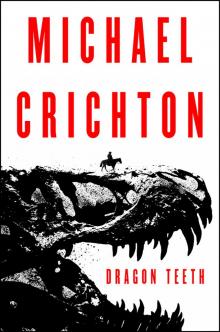 Dragon Teeth
Dragon Teeth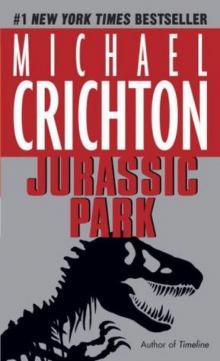 Jurassic Park
Jurassic Park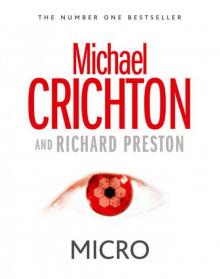 Micro
Micro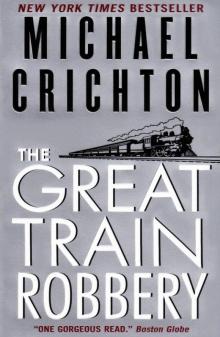 The Great Train Robbery
The Great Train Robbery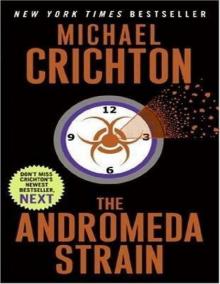 The Andromeda Strain
The Andromeda Strain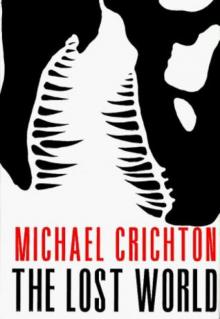 The Lost World
The Lost World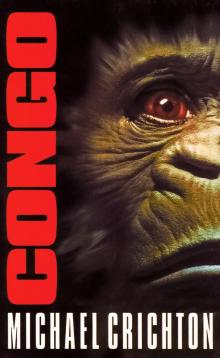 Congo
Congo Travels
Travels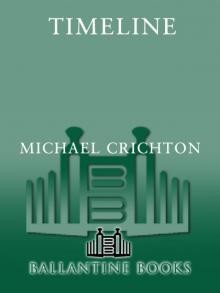 Timeline
Timeline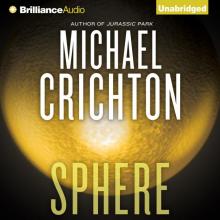 Sphere
Sphere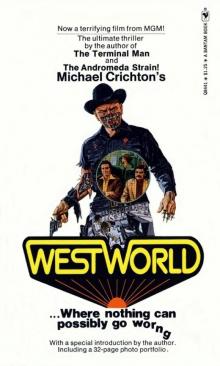 Westworld
Westworld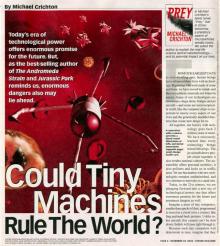 Prey
Prey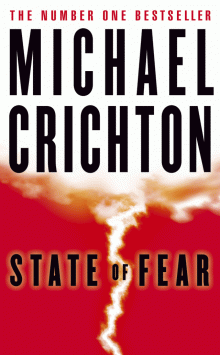 State Of Fear
State Of Fear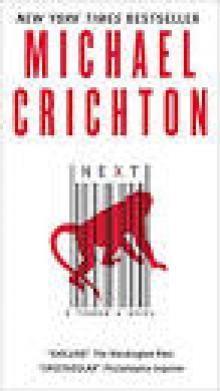 Next
Next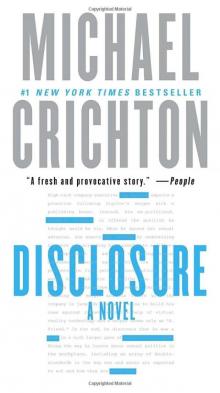 Disclosure
Disclosure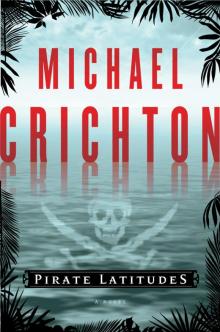 Pirate Latitudes
Pirate Latitudes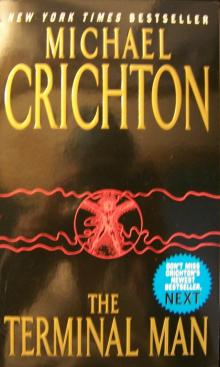 The Terminal Man
The Terminal Man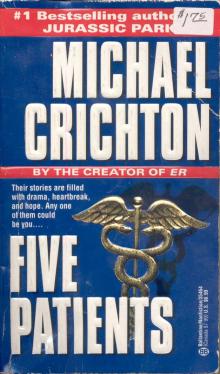 Five Patients
Five Patients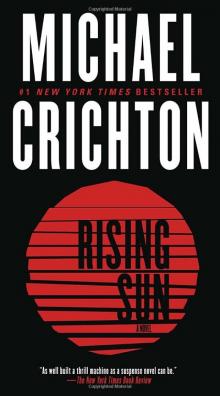 Rising Sun
Rising Sun Binary
Binary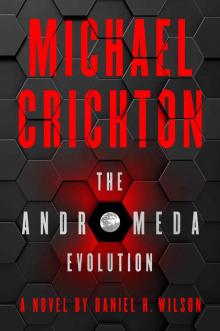 The Andromeda Evolution
The Andromeda Evolution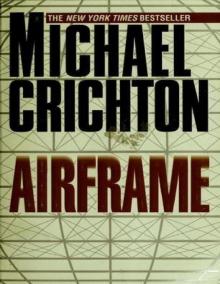 Airframe
Airframe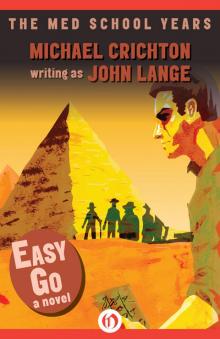 Easy Go
Easy Go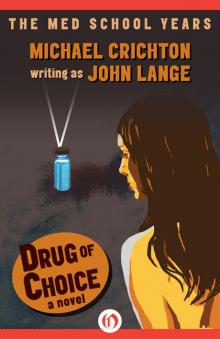 Drug of Choice
Drug of Choice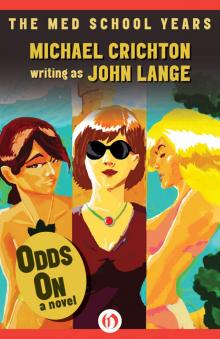 Odds On: A Novel
Odds On: A Novel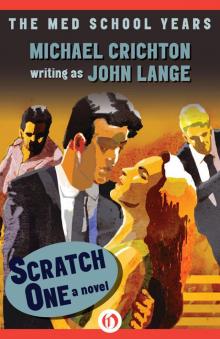 Scratch One
Scratch One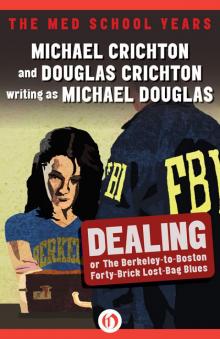 Dealing or The Berkeley-to-Boston Forty-Brick Lost-Bag Blues
Dealing or The Berkeley-to-Boston Forty-Brick Lost-Bag Blues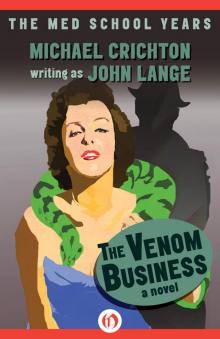 Venom Business
Venom Business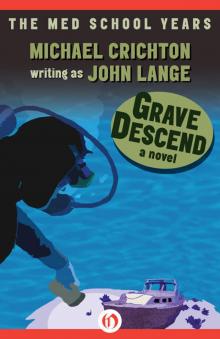 Grave Descend
Grave Descend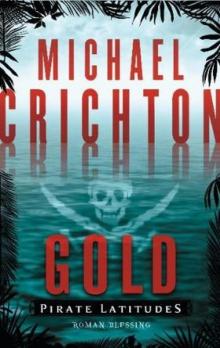 Gold - Pirate Latitudes
Gold - Pirate Latitudes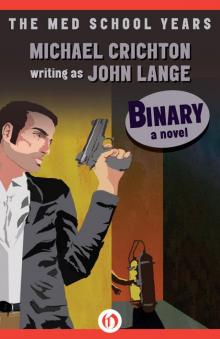 Binary: A Novel
Binary: A Novel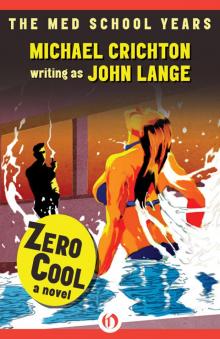 Zero Cool
Zero Cool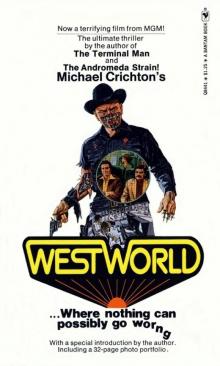 Delos 1 - Westworld
Delos 1 - Westworld